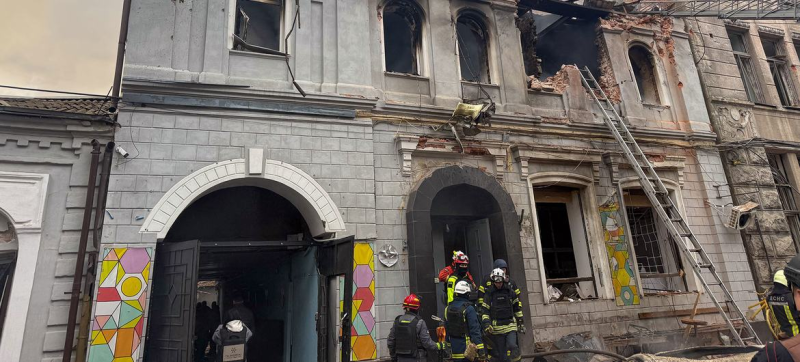- China's Xi promises to protect free trade at APEC as Trump snubs summit |
- UN Probes Iran Crackdown, Alarms Over Spike in Executions |
- UN Aid Push Continues Across Gaza Despite Airstrike Threats |
- Hurricane Melissa displaces thousands across Caribbean |
- Trump’s Nuclear Test Directive Sparks Global Alarm |
Russian Energy Strikes May Spark Major Crisis in Ukraine

Firefighters tackle a blaze at a building hosting a kindergarten in Kharkiv, Ukraine.
The UN’s top aid official in Ukraine expressed concern on Friday over “continuous attacks” on energy production sites and distribution facilities.
The heavy humanitarian and psychological toll of these strikes is compounded by the expectation that this year’s winter will be much colder than last year’s — with the destruction of power facilities outpacing the ability to recover.
“We are very worried about people living in high-rise buildings in cities near the frontline — that could turn into a major crisis,” said Matthias Schmale, the UN Resident and Humanitarian Coordinator in Ukraine, speaking to reporters in Geneva.
Mr. Schmale’s comments came a day after a massive Russian attack across Ukraine reportedly targeted critical energy infrastructure in civilian areas.
High-rise danger
With 705 munitions reportedly deployed, the barrage was among the largest since Russia’s full-scale invasion began in 2022.
If people in frontline cities like Zaporizhzhia, Kharkiv or Dnipro are “stuck without electricity or safe water for days on end” during a harsh winter, Mr. Schmale warned, “there is no way that with the available resources we would be able to respond to a major crisis within a crisis.”
“Destroying energy production and distribution capacity as winter starts clearly impacts the civilian population and is a form of terror,” he insisted. “The continued strikes throughout the country also give a sense that nowhere is safe. In my almost one and a half years here, I feel and sense that the mental health impact of this war is increasing,” he added.
Drone warfare
“This is increasingly a technological war — a drone war,” the UN official said, noting that drones were responsible for one-third of all recorded civilian casualties in 2025.
This year has seen a 30 per cent rise in civilian deaths compared with 2024.
Casualties from Thursday’s attack included a seven-year-old girl who died in hospital following a strike in the central region of Vinnytsia. Earlier this week, an attack severely damaged a children’s hospital in Kherson City, injuring a child and health workers.
The World Health Organization (WHO) has recorded 364 attacks impacting healthcare facilities in Ukraine between January and October 2025.
School horror
Mr. Schmale recounted a recent “poignant moment” visiting a kindergarten in Kharkiv shortly after it had been hit by three missiles.
“I just imagined, as a parent, you drop your children off in the morning at a kindergarten, then get called back two and a half hours later to pick up your traumatised children who’ve just experienced three missiles hitting their school,” he said.
“This notion of safety for vulnerable people and children is really being violated all the time.”
Occupied territories and rising risks
Turning to areas under Russian occupation, the UN humanitarian coordinator warned that the longer the war continues, “the more we are at risk of forgetting the vulnerable people” there.
He estimated that about one million people remain vulnerable in the so-called temporarily occupied territories.
Mr. Schmale also raised alarm over “attacks on fundamental rights,” including pressure on Ukrainians to obtain Russian documents. “If they don’t do so, they are considered illegal and are subject to either deportation or arrest,” he said.
Funding decline
The UN official expressed concern about dwindling funds for Ukraine’s humanitarian response, describing a “downward trend.”
“In 2022, we had over $4 billion for humanitarian work in Ukraine. In 2023, it was still $2.6 billion. Last year, 2024, with everything else going on in the world, it was $2.2 billion,” he said. “This year, we stand at $1.1 billion so far — half of what we received last year, with only two months remaining.”

